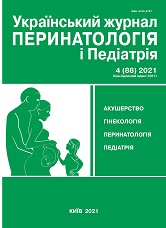Effect of antiphospholipid antibodies on the risk of implantation failure after in vitro fertilization
DOI:
https://doi.org/10.15574/PP.2021.88.14Keywords:
infertility, implantation failure, antiphospholipid syndrome, assisted reproductive technologiesAbstract
Infertility is a unique pathology because it concerns a couple, not one person, and is the cause of a whole range of medical, social, demographic and economic problems. With the active development of assisted reproductive technologies, the demand for solving the problem of infertility has grown significantly. However, the prevalence of infertility remains stable, indicating many «white» spots in the diagnosis and treatment of this pathology and determining the search for new risk factors, diagnostic criteria, and treatment algorithms.
Purpose — to analyze the factors that may affect implantation, namely the presence of lupus anticoagulant and antiphospholipid antibodies in women with infertility who have undergone in vitro fertilization.
Materials and methods. A survey of 106 women diagnosed with infertility underwent treatment with assisted reproductive technologies in September 2019 — February 2021. The control (1) group consisted of women who received infertility treatment according to the standard scheme: controlled ovarian stimulation, gamete collection, intracytoplasmic sperm injection and embryo transfer. The main (2) group included patients who received aspirin, anticoagulants, and intravenous IgG immunoglobulins in addition to the standard treatment regimen. In the present study, levels of lupus anticoagulant and antiphospholipid antibodies were determined in both groups.
Results. The study found no differences between groups of patients in levels of antibodies (AB) to phospholipids (IgG), beta-2-glycoprotein (IgG, IgM) and lupus anticoagulant (screening, confirmation) in the two groups of patients (p>0.05). Difference in two groups were in levels of AB to beta-2-glycoprotein IgM in controls, on average, 9.42 units/ml (5.86 units/ml — 12.35 units/ml), and in patients of main group — 7.23 units/ml (3.14 units/ml — 10.58 units/ml), p=0.015. One-factor logistic regression models were used to clinically understand the influence of factors associated with the risk of implantation failure. The analysis did not reveal a connection between risk of implantation failure and levels of autoantibodies (aAB) to phospholipids (IgG, IgM), beta-2-glycoprotein (IgG, IgM) and lupus anticoagulant (screening, confirmation) in two groups of patients (p>0.05 in all cases).
Conclusions. The presence of aAB and/or antiphospholipid syndrome during the establishment of infertility factors is an essential component of the algorithm for diagnostic search for the cause of infertility and miscarriage. However, based on the obtained data, the presence of aAB in the study does not affect the implantation process nor affects the treatment of infertility.
The research was carried out in accordance with the principles of the Helsinki declaration. The study protocol was approved by the Local Ethics Committee of the participating institution. The informed consent of the patient was obtained for conducting the studies.
No conflict of interest was declared by the authors.
References
Backos M, Rai R, Regan L. (2002). Antiphospholipid antibodies and infertility. Human Fertility. 5 (1): 30-34. https://doi.org/10.1080/1464727992000199731; PMid:11897906
Carp HJ, Selmi C, Shoenfeld Y. (2012). The autoimmune bases of infertility and pregnancy loss. Journal of autoimmunity. 38 (2-3): J266-J74. https://doi.org/10.1016/j.jaut.2011.11.016; PMid:22284905
Danowski A, Kickler TS, Petri M. (2006). Anti-beta2-glycoprotein I: prevalence, clinical correlations, and importance of persistent positivity in patients with antiphospholipid syndrome and systemic lupus erythematosus. The Journal of rheumatology. 33 (9): 1775-1779.
Di Simone N, Raschi E, Testoni C, Castellani R, D'Asta M, Shi T et al. (2005). Pathogenic role of anti-β2-glycoprotein I antibodies in antiphospholipid associated fetal loss: characterisation of β2-glycoprotein I binding to trophoblast cells and functional effects of anti-β2-glycoprotein I antibodies in vitro. Annals of the rheumatic diseases. 64 (3): 462-467. https://doi.org/10.1136/ard.2004.021444; PMid:15256379 PMCid:PMC1755387
Hornstein MD, Davis OK, Massey JB, Paulson RJ, Collins JA. (2000). Antiphospholipid antibodies and in vitro fertilization success: a meta-analysis. Fertility and sterility. 73 (2): 330-333. https://doi.org/10.1016/S0015-0282(99)00498-7
Ninivaggi M, Kelchtermans H, Lindhout T, de Laat B. (2012). Conformation of beta2glycoprotein I and its effect on coagulation. Thrombosis research. 130: S33-S36. https://doi.org/10.1016/j.thromres.2012.08.269; PMid:22925530
Sauer R, Roussev R, Jeyendran RS, Coulam CB. (2010). Prevalence of antiphospholipid antibodies among women experiencing unexplained infertility and recurrent implantation failure. Fertility and sterility. 93 (7): 2441-2443. https://doi.org/10.1016/j.fertnstert.2009.08.062; PMid:19962695
Shoenfeld Y, Carp HJ, Molina V, Blank M, Cervera R, Balasch J et al. (2006). Autoantibodies and prediction of reproductive failure. American Journal of Reproductive Immunology. 56 (5-6): 337-344. https://doi.org/10.1111/j.1600-0897.2006.00434.x; PMid:17076678
Stern C, Chamley L, Hale L, Kloss M, Speirs A, Baker HG. (1998). Antibodies to β2-glycoprotein I are associated with in vitro fertilization implantation failure as well as recurrent miscarriage: results of a prevalence study. Fertility and sterility. 70 (5): 938-944. https://doi.org/10.1016/S0015-0282(98)00312-4
Downloads
Published
Issue
Section
License
Copyright (c) 2022 Ukrainian journal of Perinatology and Pediatrics

This work is licensed under a Creative Commons Attribution-NonCommercial 4.0 International License.
The policy of the Journal “Ukrainian Journal of Perinatology and Pediatrics” is compatible with the vast majority of funders' of open access and self-archiving policies. The journal provides immediate open access route being convinced that everyone – not only scientists - can benefit from research results, and publishes articles exclusively under open access distribution, with a Creative Commons Attribution-Noncommercial 4.0 international license(СС BY-NC).
Authors transfer the copyright to the Journal “MODERN PEDIATRICS. UKRAINE” when the manuscript is accepted for publication. Authors declare that this manuscript has not been published nor is under simultaneous consideration for publication elsewhere. After publication, the articles become freely available on-line to the public.
Readers have the right to use, distribute, and reproduce articles in any medium, provided the articles and the journal are properly cited.
The use of published materials for commercial purposes is strongly prohibited.

